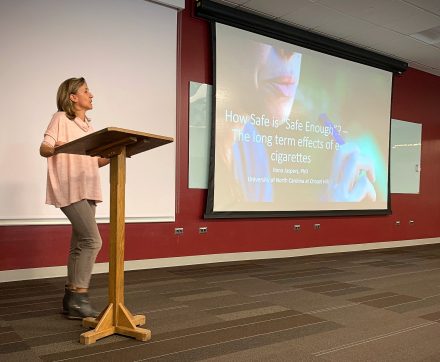Campus Recreation and Wellness is raising awareness of the dangers of e-cigarettes, while taking steps to combat their use on campus and beyond.
As e-cigarettes continue to take a toll on their users, Elon Campus Recreation and Wellness is working to spread the message of the dangers associated with them throughout the campus community.
According to the Centers for Disease Control and Prevention, 42 deaths related to e-cigarette use have been reported in 24 states, since the first reported death in August 2019. As of Nov. 13, the number of nationwide cases of injuries related to e-cigarette use had climbed to 2,172 in 49 states (Alaska has no reported cases to date), the District of Columbia and two U.S. territories.
During a lunch-and-learn session in Moseley Center on Tuesday, students, faculty and staff learned about the effects of e-cigarettes from Ilona Jaspers, director of the toxicology curriculum at the UNC School of Medicine.

In the lecture, titled “How Safe is ‘Safe Enough?’ The Long-Term Effects of E-Cigarettes,” Jaspers outlined her research on e-cigarettes, including the impact they’ve had on society in a short period of time, specifically among young people. Jaspers revealed an estimated five million high school students across the nation have admitted to using e-cigarettes over the past 30 days.
While discussing the dangerous chemicals used in e-cigarettes and other vaping devices, Jaspers shined light on the popular JUUL e-cigarette brand. She explained one JUUL pod has the same effect on the body as smoking 41 traditional cigarettes.
“The problem here is that JUUL is considered to be like an 11th finger for adolescents,” Jaspers said during Tuesday’s lecture. “They have JUUL with them all the time, next to their bed. There’s no defined start and finish, so they’re constantly vaping, and that’s where the increased amount of nicotine and potential addiction comes from.”

Jaspers has been featured in several national media outlets, including the New York Times and NBC News, for her research on the effects of e-cigarettes. She is currently studying the long-term effects on the respiratory mucosa and how inhaled chemicals, particles and other agents affect human health.
Coordinator of Student Wellness Callie Kelly invited Jaspers to campus as a part of Elon’s broader efforts to raise awareness and combat the use of vaping devices.
The fight against nicotine is not only professional, but a personal battle for Kelly, who lost her father to complications from smoking and has since devoted her career to prevention. She organized Tuesday’s lunch-and-learn to spark a conversation about the dangers of cigarettes and e-cigarettes.
“I know the addictive nature of this substance and how it can completely diminish your quality of life,” she said. “The tobacco companies didn’t want you to know that, and likewise, the e-cigarette companies don’t want you to know that either.”
Following Jaspers’ lecture, Campus Recreation and Wellness will take its message to the broader campus community. On Thursday the department will host “#ReadytoQuit – Great American (Vape) Out,” which is aimed at curbing the use of e-cigarettes, as well as other products containing nicotine, among students.
The event is in partnership with “The Great American Smokeout,” an annual intervention event hosted by the American Cancer Society on the third Thursday in November.

From noon to 2 p.m. this Thursday in Moseley Center, SPARKS (Students Promoting Awareness, Responsibility, Knowledge and Success) peer educators will offer information about the dangers of vaping. They will also present “Quit Kits” to anyone looking to kick the habit or for those who know someone else looking to do so. The kits include information about quitting, fidget tools and other items to help with the process.
Along with the kits that are offered year-round through Campus Recreation and Wellness, Kelly plans to introduce a new exchange program this spring for people with vaping devices. SPARKS will operate a mobile exchange unit on campus, offering information about quitting while also accepting vaping devices in return for gift cards, personal training passes and other items.
As a resource for students, faculty and staff, Kelly has also created a webpage about substance education at Elon, specifically as it relates to vaping. Find advisories from the CDC, vaping facts and information about quitting here.
Kelly hopes these programs offer someone the support they need to kick the habit for good.
“This is just a start, but I think we’re moving in the right direction,” she said.



